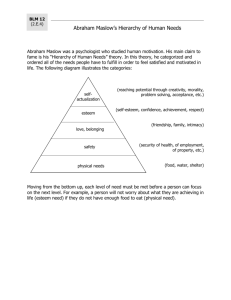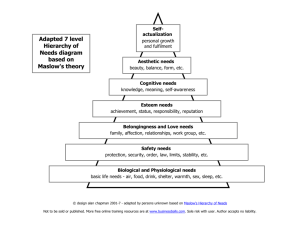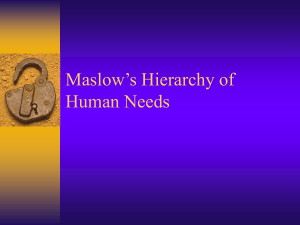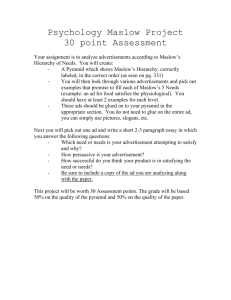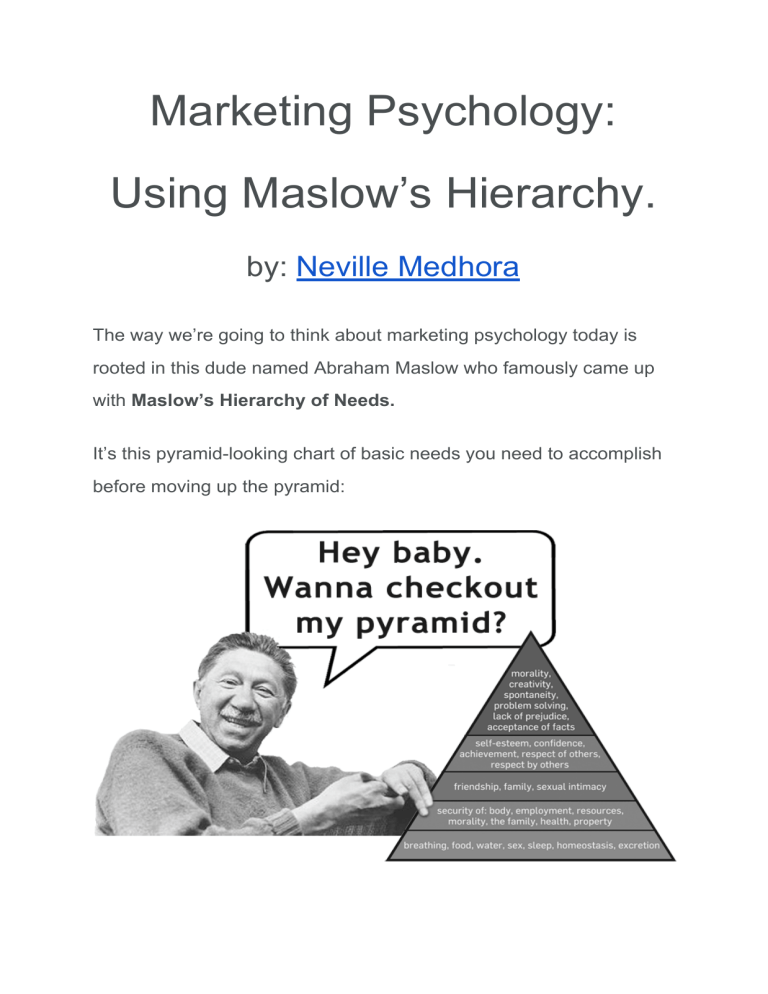
Marketing Psychology: Using Maslow’s Hierarchy. by: Neville Medhora The way we’re going to think about marketing psychology today is rooted in this dude named Abraham Maslow who famously came up with Maslow’s Hierarchy of Needs. It’s this pyramid-looking chart of basic needs you need to accomplish before moving up the pyramid: We’re using this pyramid as the basis of how to market to specific groups of people, as they respond to vastly different messages. If you want to figure out what piece of society you’re trying to market to, just find where Maslow’s Hierarchy of Needs your average customer fits: Figure out what piece of society you’re talking to: Poor people respond to certain things. Middle Class people respond to certain things. Rich people respond to certain things. Similarly people on different rungs of Maslow’s Hierarchy of Needs respond to different things. Since we’re greedy little marketers we need to know which stage we should be going after….let’s take a look at this Hierarchy of Needs to understand the marketing psychology behind each stage: Your position in this pyramid is fluid through your life. You might be on the lower rungs now, but in 5 years could be at the top. You can also dramatically drop in the pyramid for a variety of reasons. For example, let’s say someone spent $6,000 to attend a conference on how “To be the best version of your actualized self” (or some high-level hippie crap like that). They will be super interested to attend every session, UNLESS all of a sudden they dramatically drop on Maslow’s Hierarchy of Needs….. ……maybe they’ve been holding back a massive poop for 4 hours, and now IT’S EMERGENCY STATUS. They have effectively been pushed back down to a low level of Maslow’s Hierarchy of Needs at this moment to the Physical level. Nothing at this point will take their mind off the absolutely urgent need to excrete! Yes, I just used a poop joke to teach you about Maslow’s Hierarchy of Needs….but you will probably remember that FOREVER ;-) That example is a very temporary one. As soon as the person finds a restroom and takes care of bidnaz, they’re back to their normal top-of-the-hierarchy self. Similarly, if someone at the top of the pyramid just moved to a new city across the world and they have no family, no friends, no significant other……this might make them very sad, and push this person down the pyramid to the Love/Belonging stage. It will probably become a big obsession of theirs to make sure they find a new source of love & friendship in this new city: Until this person gets that feeling of love and belonging back into their life, it’ll be hard to move beyond that stage for them. Also the broader economic climate dictates where most people will be in Maslow’s Hierarchy. If the economy has been booming for five years straight and everyone is still drunk off cheap money, easy employment, and good economic news……then a lot of people will be at the top tiers of Maslow’s Hierarchy because the economy is booming, everyone is making great money and everyone in happy. However if the economy collapses, people are losing their jobs, losing their savings, and all the news is bad…..then a lot of people will get pushed lower down the Hierarchy: Now let’s see what people at each stage of the Hierarchy need and want (so we can better sell to them)! –What people at each stage of Maslow’s Hierarchy are looking for– The Physiological (Physical) Stage: WHO IT IS: This is going to be people in 3rd world countries, people in disaster zones, someone lost in the woods. For the most part, you probably won’t be marketing to this crowd as they have bigger problems (such as staying alive) and they probably have little to no money. WHAT THESE PEOPLE WANT: ● Food. ● Clean air. ● Clean water. ● To take a poop (like our friend here). You probably shouldn’t be marketing to these people. You should be helping them. These are going to be some of the poorest and most helpless people. So marketing to them would not be lucrative for the most part, and you might be kind of an asshole if you’re too predatory on them. The Safety Stage: WHO IT IS: These are people that would be considered “poor” or “lower middle class”. They live extremely paycheck-to-paycheck and have little-to-no support structure if they get kicked out of their dwelling. These are people that if they stopped working, would be 2-3 months away from being homeless. Most people reside their entire lives here, and until pretty recently in society, most of the world constantly lived at this rung in Maslow’s Hierarchy. ● They fear they’ll lose their income. ● They don’t have a backup plan or savings. ● They don’t have skills that secure their income earning potential. ● They aren’t entirely sure they can fund their children’s education. ● They likely work at a pretty crappy or boring job out of necessity. A lot of predatory businesses prey on this level of people because they’re the easiest to trick, the most hopeful, BUT they they still have enough income to spend money on things. If you were to put out a scammy ad that said: “Work at home! Make $3,000/week! Barely have to work!” You’d most likely get people in this rung of the hierarchy responding the most. WHAT THESE PEOPLE WANT: ● They want to have stable incomes. They respond well to “Side Income” kind of talk. ● They want to live in a stable environment. They probably don’t live in the greatest of place (either country with unstable government, or live in a household they share with a lot of people). ● Affordable access to medical services. ● A safe place to call their own home. ● Providing basic needs for children. The Love/Belonging Stage: WHO IT IS: These are typically people in the middle class or higher. They have their basic needs met. They live in a decent place, have a decent income, have a decent savings. Typically these people are relatively educated, and have a decent amount of money to spend. This is the level a lot of middle class people in a society will be in. They’re probably not looking to change the world, but they want to create a small little world around them where they belong. They probably have jobs that aren’t terrible, but also aren’t a bundle of joy. They typically look outside of their work to find happiness. WHAT THESE PEOPLE WANT: ● They want to join groups and be part of groups. (Church, sports, classes). ● They want to have fun with family and friends, and will look (and pay) for novel ways to do it. ● They want to have a sense of community. The Esteem Stage: These are people in the upper middle-class and higher. You know someone is in the “Esteem” stage when they say stuff like “I want to DO something with my life.“ I would like to remind you that this stage in life is a luxury afforded by the advances in our society. In the past you’d only get very wealthy members of society hitting this level. Now with all the cool stuff we have, this level can be reached by nearly everyone in a stabilized society and a decent income. WHAT THESE PEOPLE WANT: ● Need to respect themselves. ● Need for others to have respect for them. ● Need to feel important. ● Need to feel accomplished. ● Want their job to not only provide money, but also be “fulfilling.” The Self Actualization Stage: WHO IT IS: These are people who’ve accomplished everything they need to. Often people who’ve made their “Fuck You Money“ and no longer worry about things like income or being able to provide for their families. This “Self Actualization” rung is where you get people who have #WhitePeopleProblemsand # 1stWorldProblems. WHAT THESE PEOPLE WANT: ● To solve hard problems. ● To be creative and abstract. ● They want to “make every moment count.” ● They want their lives to be filled with “satisfying” activities. This is where upper-middle-class and rich typically are. This spot is weird…..because I think once you reach the top (with current human biology) you artificially have to put yourself back down the hierarchy and start over, like this (my opinion): For 99% of human history almost no one ever reached this stage. And it’s actually interesting to watch as huge portions of our society hit this top stage at a young age. But people at this stage will pay for things like: ● Seeing the world. ● Figuring out how to be more effective. ● Figuring out the “meaning” of life. ● Searching for a “higher purpose.” If I had to sum up what people at each stage would say in one short sentence it’s: The Physical Stage: “I wish I had food to live.” The Safety Stage: “I wish I had a stable job.” The Love Stage: “I wish I belonged to a group of people that love me.” The Self Esteem Stage: “I wish I had a respectful job where I can be in air conditioning all day.” The Self-Actualization Stage: “I wish I had a life path that I really love, pays better than my peers, and helps people.” KopywritingKourse.com
